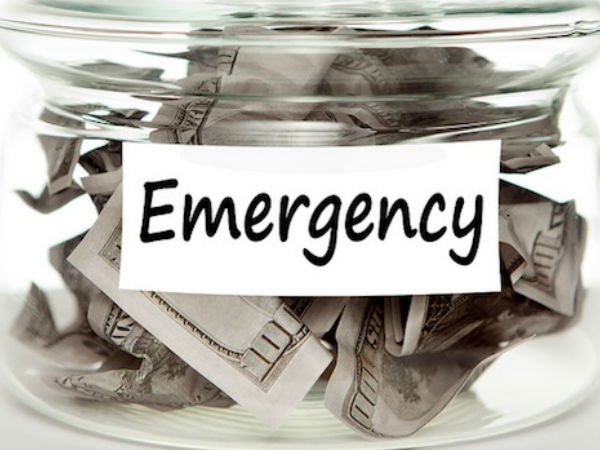How to Safeguard Money During Recession?
Recession is something which is much beyond the control of human beings but we can control the situation by preparing ourselves and by the way we respond and tackle the situation.
With volatile markets, slumping oil prices, increasing debt levels and rallying gold prices, following some money-saving tips will be a lifesaver as this will protect you, your family from a worse situation and you will know how to survive a recession.

Recession is something which is much beyond the control of human beings but we can control the situation by preparing ourselves and by the way we respond and tackle the situation. Taking necessary precautionary measures is the key to safeguard your finances, so before the financial downturn hits and make things callous, follow a few steps and recession-proof your money.

Create an Emergency Corpus Fund
Having an emergency corpus fund is the first step in any financial plan. But during a distressing situation, such funds are simply indispensable. Experts advise that the tune of this emergency corpus should be equal to at least six month's expenses, though some suggest a larger fund giving the uncertainty of the situation. The best thing is to take into account your earnings, family structure, monthly expenditure before arriving at the final figure.
If a family is having a double income, then six months expenses would be sufficed even if one of them lose their jobs. But if it is a single income family, then the bigger would be better. Families who have a single breadwinner should build a corpus which covers close to 9 - 12 months expenses.
Other than the daily expenses, like grocery, school fees, utility bills, medicines, one should set aside an additional amount to meet unforeseen expenses. And the same should be parked in liquid instruments so that you will be able to realize them any time as and when they are needed.
Usually, tough times last longer than we would thing hence one should refrain from using the credit card as the plastic money is a mistake which often haunts people for the long term. Many of them will not foresee the reality that they indeed will be requiring a larger income than they currently have to repay both interest and principal they had borrowed during the tough times to meet both the ends.

Cut Down on Unnecessary Spends
There is a famous saying which states - ‘A Penny Saved is a Penny Earned.' During a recession, one should examine the list of expenses and try to erase out the unwanted spends as this will help you to save more money. One should tweak their lifestyle and budget and avoid going for a big-ticket purchase.
The ultra-modern lifestyle has forced people to go in for branded clothes, signing in for club membership, joining gym classes and eating out quite often and the list goes on. You will be in for a surprise by how much you can save even by trimming down on small expenses.
Say a big no to big-ticket expenses. If you have plans to purchase a home, car or going for a foreign vacation, put all of them on hold for some time till your finances are stable and secure. If it is not possible to let them go, then look out for alternatives like pre-owned cars or properties. But be careful and go for ‘certified pre-owned cars' which have been thoroughly checked in by the dealers and have original specifications.
Never finance your purchases with the amount which is expected in the future (as the future is uncertain). These include a hike in salary, profit from investments, annual bonus, variable pay and so on.

Diversify Income
Depending solely on one source of income has its own inherited risk, because if the economy witnesses a downturn then possibilities of losing a job is higher. Having multiple sources of income will come in handy and it will indeed be helpful during a difficult situation. If income from one source starts to decline or gets eliminated, then getting income from another source will back you.
Diversifying your income does not mean holding more than one job at a time, if your spouse is working, then you will have some income diversity.
You can rent out a room in your house or garage and fetch some income from a property. If you have a flexible schedule, then working during weekends will also help you to earn income. If you are good at a talent or skill, then utilizing it potentially can earn extra income.

Choose Less Volatile Funds
In the current scenario, hybrid funds are the best one to go for as it protects the downside risk for an investor. They are structured to limit the turbulent returns and suits most of the investors who can't take the swings (ups and downs) of the equities markets but yet yearn for some exposure to equities. The hybrid funds as the name suggests comes in different flavours.
The balanced advantage funds or dynamic asset allocation invests across equity, debt, thus varying the exposure to either segment from potentially zero to 100%, based on the prevailing valuations. In this way, the hybrid funds can swing towards either end of the asset spectrum to cap volatility. In case of balanced advantage funds, some element of arbitrage via equity derivatives will be present.

Diversify Investments
Diversifying investments is a very important task during a recession. If you have all your money parked in equities markets, then it will be a disaster during the economic downturn. The volatile market will further make things worse. So individuals must diversify their investments across the various segments of portfolios to minimize the risk factor.
In case of diversification of investment, one can look out for an array of investment vehicles be it purchase of land or property which will appreciate over some time or investing in bonds which is a good way to generate income or can purchase gold which has indeed given the best returns to its investors over the last two years apart from being the safest bet when it comes to investment.
GoodReturns
About the Author
Archana is a content writer at GoodReturns. She has been writing articles related to investment planning and personal finance for more than two years.































